Natural Immune Boosters You Can Rely On for a Healthier Life
Keeping your immune system strong is vital for preventing illness and ensuring overall health. While modern medicine provides treatments, adding natural immune…
Yorest can help build your immunity to fight against viral and bacteria infections
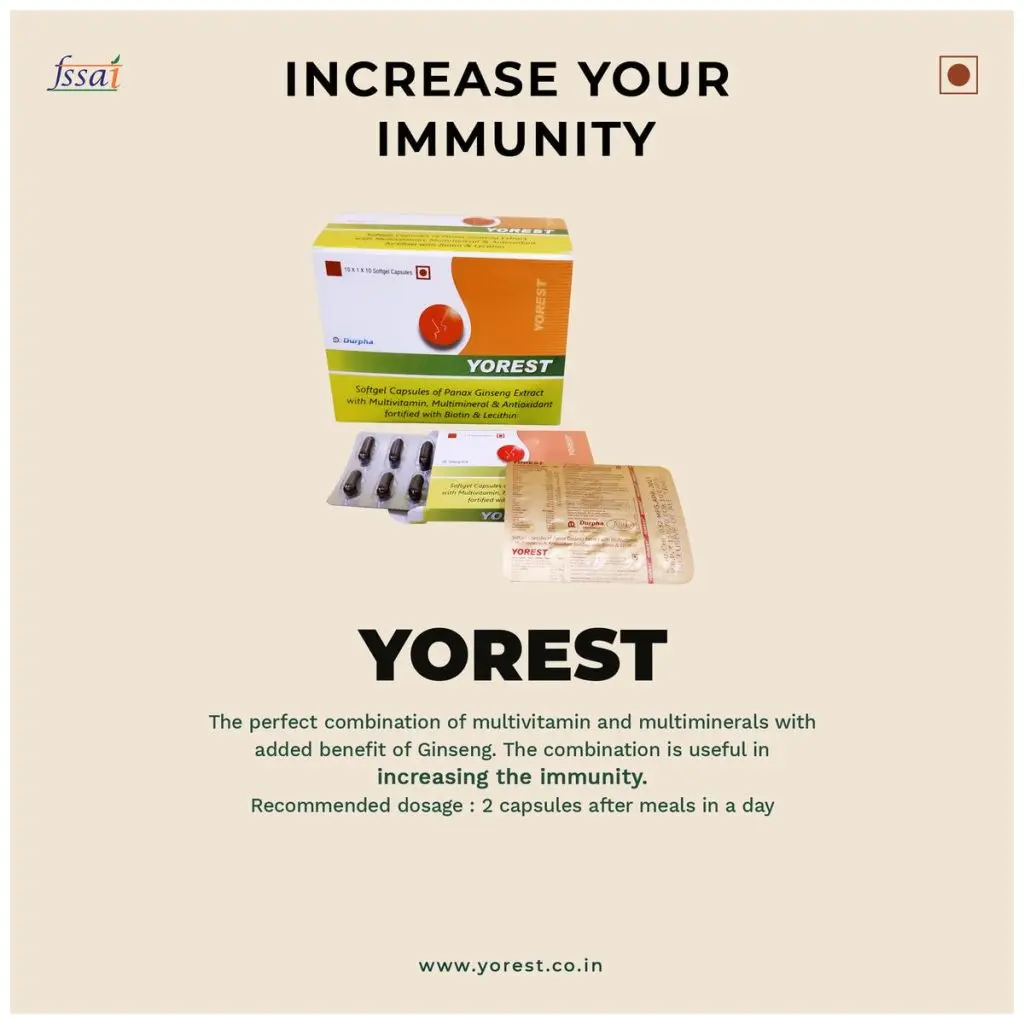
Yorest immunity booster capsules are enriched with the goodness of ginseng extract and are fortified with the added benefits of vitamins, minerals, and antioxidants which are very helpful and beneficial in our overall health development. The perfect combination of multivitamins and multiminerals with added benefits of ginseng. The combination is useful in increasing immunity.
Yorest can help build your immunity to fight against viral and bacterial infections. Improve your immune system with YOREST which provides the best immunity boosters that are formulated using natural ingredients, are effective, and show no known side effects. Benefits of Vitamin C, Zinc, Ginseng. An excellent way to increase immunity.
Yorest keeps improve your immune system and energizing whether you're feeling drained or need a boost.
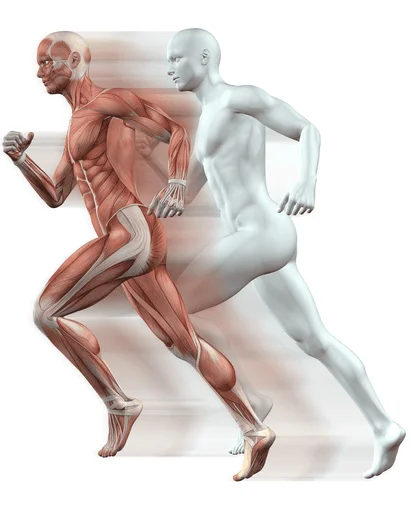
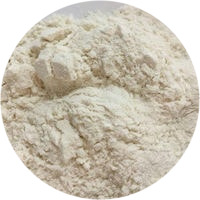
For ages, both Asia and North America have used ginseng. Many people take it to increase their mental clarity, focus, memory, and physical stamina.
Additionally, it is used as a natural remedy for chronic fatigue, sadness, and anxiety. This well-known plant has a reputation for strengthening the immune system, warding off infections, and aiding erectile dysfunction in males.
The root was originally utilized by Native Americans as a stimulant, headache therapy, and cure for indigestion, fever, and infertility.
Approximately 6 million Americans daily benefit from the confirmed ginseng benefits today.

Because it is water soluble, vitamin C is not stored by the body. People must regularly eat foods containing vitamin C in order to maintain optimal amounts of the vitamin.
The body requires vitamin C for a number of processes. Here are a few examples:
It aids in the body’s production of L-carnitine, certain neurotransmitters, and collagen.
As an antioxidant, it aids in the removal of harmful molecules from the body known as reactive oxidative species (ROS).
It aids iron absorption in the body.
Increased immune function results.
It speeds up wound recovery.
Free radicals and other compounds known as ROS are byproducts of normal biological functions, pollution exposure, and other reasons. They might result in oxidative stress, which might damage cells.

The second of the eight B vitamins is known as riboflavin. All B vitamins assist the body’s process of converting food (carbohydrates) into the energy-producing fuel glucose. These B vitamins, commonly known as the B-complex vitamins, aid the body in the metabolism of fats and proteins. The liver, skin, hair, and eyes all require the B complex vitamins for good health. Additionally, they support healthy nervous system operation.
Because they are all water soluble, the B vitamins are not stored by the body.
Riboflavin not only gives the body energy but also functions as an antioxidant to combat harmful molecules called free radicals. Free radicals can harm cells and DNA, and may contribute to the aging process, as well as the development of a number of health disorders, including as heart disease and cancer. Riboflavin is an antioxidant that can combat free radicals and potentially lessen or even assist avoid some of the harm they cause.
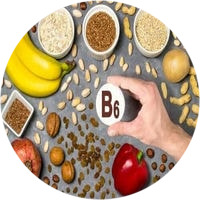
The sixth of the eight B vitamins is known as pyridoxine. All B vitamins assist the body’s process of converting food (carbohydrates) into the energy-producing fuel glucose. These B vitamins, commonly known as the B-complex vitamins, aid the body in the metabolism of fats and proteins. Healthy skin, hair, eyes, and liver depend on the B-complex vitamins. Additionally, they support healthy nervous system operation.
Because they are all water soluble, the B vitamins are not stored by the body.
The body produces numerous neurotransmitters with the help of vitamin B6, which are substances that convey messages from one nerve cell to another. It is necessary for healthy brain growth and function, as well as for the body to produce the hormones melatonin, which helps regulate sleep, and the mood-altering hormones serotonin and norepinephrine.
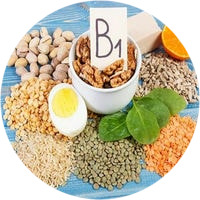
Thiamine (vitamin B1), which can be found in many foods, is used to treat Wernicke-Korsakoff syndrome, low thiamine, beriberi, and a few other nerve illnesses. (WKS).
Our bodies need thiamine to use carbohydrates correctly. Additionally, it supports healthy nerve performance. It can be found in foods including meat, beans, nuts, yeast, and cereal grains. It is present in many vitamin B complex preparations and is frequently used in conjunction with other B vitamins.
Thiamine is used to treat diseases including beriberi and nerve irritation that are caused by low levels of the vitamin. (neuritis). There is no reliable scientific evidence to support its usage for several additional illnesses, including heart disease, diabetic nerve pain, and digestive issues.
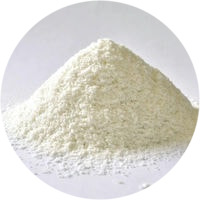
Vitamin E , commonly referred to as cosmetic grade vitamin E, is a popular vitamin supplement. Cosmetic grade vitamin e is frequently used in skin care products like skin creams. Pure vitamin e oil is an ester of acetic acid and tocopherol (vitamin E). Cosmetic-grade vitamin E is not oxidized and can enter live cells through the skin. There, about 5% of it is transformed to free tocopherol, which has protective antioxidant effects. Cosmetic grade vitamin E is utilized in place of tocopherol itself because the phenolic hydroxyl groups are inhibited, resulting in a less acidic product with a longer shelf life. Cosmetic-grade vitamin e is believed to provide sun protection by slowly hydrolyzing after being absorbed into the skin to regenerate tocopherols.
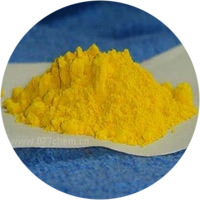
Among vitamins is vitamin A. Numerous fruits, vegetables, eggs, whole milk, butter, fortified margarine, meat, and oily saltwater seafood all contain it. It can also be produced in a lab. A class of yellow or orange compounds called carotenoids are present in plants. Some of these can be transformed by the body into vitamin A.
Treatment for a vitamin A deficit involves vitamin A. It is also used to enhance growth in kids who are vitamin A deficient as well as to lessen the effects of illnesses like malaria, HIV, measles, and diarrhea.
Some people take vitamin A to enhance eyesight and treat eye conditions such cataracts, retinitis pigmentosa, glaucoma, and age-related macular degeneration (AMD). After eye surgery, it may also be used to speed up healing.
In addition to treating acne and other skin diseases, vitamin A is also used to treat psoriasis, eczema, cold sores, wounds, burns, sunburn, ichthyosis (noninflammatory skin scaling), lichen planus pigmentosus, and pityriasis rubra pilaris.

Vitamin D, commonly known as “calciferol,” is a fat-soluble vitamin that is added to some foods, found naturally in a small number of others, and is also sold as a dietary supplement. Additionally, it is created internally when ultraviolet (UV) rays from sunshine strike the skin and start the production of vitamin D.
The biological inactive vitamin D that is received through sunlight, meals, and supplements must go through two hydroxylations in order to become active in the body. Vitamin D undergoes its first hydroxylation in the liver, resulting in 25-hydroxyvitamin D [25(OH)D], sometimes referred to as “calcidiol.” The physiologically active 1,25-dihydroxyvitamin D [1,25(OH)2D], often known as “calcitriol,” is created by the second hydroxylation, which largely takes place in the kidney.
Vitamin D maintains sufficient serum calcium and phosphate concentrations and encourages calcium absorption in the gut.
For healthy bone mineralization and to prevent hypocalcemic tetany, vitamin D maintains adequate serum calcium and phosphate concentrations and encourages calcium absorption in the gut. (involuntary contraction of muscles, leading to cramps and spasms). Additionally, osteoblasts and osteoclasts need it to repair and build new bone. Without enough vitamin D, bones may become fragile, deformed, or thin. Inadequate vitamin D prevents osteomalacia in adults and rickets in youngsters. Vitamin D, together with calcium, aids in preventing osteoporosis in older people.
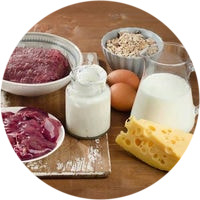
Cobalamin, a name for vitamin B12, is one of the eight B vitamins. All B vitamins assist the body’s process of converting food (carbohydrates) into the energy-producing fuel glucose. These B vitamins, commonly known as B complex vitamins, aid in the body’s utilization of fats and proteins. In order to have healthy skin, hair, eyes, and liver, one must take b complex vitamins. Additionally, they support healthy nervous system operation.
The body does not store any B vitamins because they are all water soluble.
The creation of DNA and RNA, the body’s genetic material, as well as maintaining healthy nerve cells are two of the vitamin B12’s key functions. Vitamin B12 and vitamin B9, often known as folate or folic acid, collaborate closely to support the body’s absorption of iron and the production of red blood cells. S-adenosylmethionine (SAMe), a substance implicated in immune function and mood, is created when folate and B12 combine.
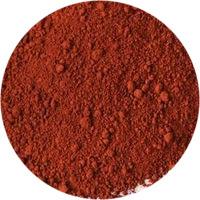
One form of iron is ferrous fumarate. Typically, the foods you eat provide you with iron. Iron is incorporated into your body’s hemoglobin (HEEM o glo bin) and myoglobin. (MY o glo bin). Your blood’s hemoglobin provides oxygen to your tissues and organs. Your muscle cells can store oxygen thanks to myoglobin.
Anemia caused by a lack of iron is treated with ferrous fumarate. (a lack of red blood cells caused by having too little iron in the body).
When taking your ferrous fumarate dose, avoid consuming meals high in fiber. Whole grains, uncooked veggies, and bran are examples of high-fiber foods.
You should wait at least 2 hours before or 2 hours after taking ferrous fumarate to consume any milk or other dairy products.

Workhorse element zinc is essential to numerous industrial processes that are frequently hidden from view. Archaeologists have discovered a small number of zinc artifacts that date as far back as 300 B.C., demonstrating that humans have employed zinc for many millennia. The metal is largely used today to coat steel and iron to stop rusting. But more crucially, zinc is necessary for a healthy diet. In reality, it is one of the most intricate and useful trace elements in our diet, and a lack of it can cause a variety of serious health issues.
Although the use of zinc dates back to antiquity, life sciences have long disregarded its significance. Scientists note that zinc was first recognized as being necessary for human health in 1961, and we are still learning exactly what functions this vitamin performs in our systems.
The finest sources of zinc, symptoms of potential deficiency, and what the science says about zinc’s potential health benefits are all covered in this article.
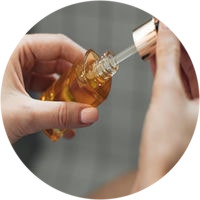
A kind of vitamin B3 is nicotinamide, often known as niacinamide. In addition to meat, fish, milk, eggs, green vegetables, and cereals, it can also be found in many other foods.
For sugars and fats to operate properly in the body and to keep cells healthy, niacinamide is necessary. When niacin is consumed in quantities more than what the body requires, it is transformed to niacinamide. Niacinamide doesn’t aid in the treatment of elevated cholesterol, unlike niacin.
Niacinamide is used to prevent vitamin B3 deficiency and related illnesses including pellagra. There isn’t enough solid scientific evidence to support the majority of these claims, which include treating ailments including acne, diabetes, cancer, osteoarthritis, aging skin, skin discolouration, and many others.
Niacinamide should not be confused with niacin, nicotinamide riboside, inositol nicotinate, or NADH.
Niacinamide should not be confused with niacin, L-tryptophan, NADH, nicotinamide riboside, or inositol nicotinate.
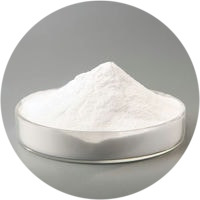
A kind of pantothenic acid, or vitamin B5, is called D-calcium pantothenate. found in milk, cereal grains, eggs, legumes, and both plant and animal tissues. Most well-known for boosting levels of glutathione, an essential substance assisting in the oxidation-reduction of cells, which protects cells against peroxidative damage.
A study of vitamin B5 is essentially what it takes to comprehend D-calcium pantothenate and the advantages it offers. The fifth of the eight B vitamins is frequently forgotten. It is a crucial ingredient that synthesizes and metabolizes lipids, carbohydrates, and proteins. It is also water-soluble and plays a significant role in supporting the efficiency of enzymes. These processes provide vitamin B5 a broad impact on how the body works.

Your body requires the mineral magnesium to function properly. It supports hundreds of vital bodily functions, including those that regulate the function of your muscles and nerves. It aids in maintaining appropriate blood sugar levels, a healthy heart, and strong bones. It also affects how energetic you are. Magnesium is present in a variety of foods and beverages. However, if your doctor believes you require more, they might advise adding supplements.
About 310 milligrams of magnesium are required by an adult woman per day, and 320 mg beyond the age of 30. Women who are pregnant require an extra 40 mg. Under-31-year-old adult men require 400 milligrams, and those over-31 need 420 milligrams. Depending on their age and gender, children need anywhere between 30 and 410 milligrams. How much magnesium your child requires should be discussed with your pediatrician.

Each and every cell in your body needs the mineral potassium. It supports the proper functioning of virtually every organ in your body, including the heart, kidneys, brain, nerves, and other muscles. The amount of things it can perform for you could surprise you.
Like calcium, sodium, and other electrolytes, it is one of those. They regulate the amount of water in your body, support the maintenance of your body’s electrical system, and transport nutrients and waste out of your cells. Additionally, potassium controls sodium, which among other things lowers blood pressure.
By balancing the amount of potassium taken with the amount lost, the body maintains the proper level. Potassium is mainly excreted in urine and ingested in foods and beverages that also include electrolytes like potassium. In addition to sweating and digestion, potassium is also lost. Potassium excretion can be adapted by healthy kidneys to match variations in consumption.
The flow of potassium into and out of cells is impacted by a number of medicines and medical conditions, which significantly affects the potassium level in blood.

Numerous biological processes, such as the metabolism of amino acids, cholesterol, glucose, and carbohydrates, are aided by manganese. Additionally, it helps with blood coagulation, bone development, and inflammation control.
The liver, pancreas, bones, kidneys, and brain may all store manganese, which the human body cannot make. Manganese is typically consumed as part of a healthy diet.
Superoxide dismutase is an antioxidant enzyme that manganese aids in the formation of. (SOD). Free radicals, which are chemicals that kill or harm bodily cells, are kept at bay by antioxidants.
This procedure may lessen inflammation caused by inflammatory bowel disease, psoriasis, and lung pleurisy in animal and laboratory models.

The majority of people associate copper with the metal used to create bright pennies. However, copper is a necessary vitamin that has an impact on your health.
Your body uses copper in a wide variety of ways. Your skin, nails, and hair all get better. Additionally, it promotes healthy organ function. Even during pregnancy, it promotes fetal growth.
Most proteins in your body include some copper. It is necessary for a body to function properly and be in good health.
Copper is necessary for your body to perform necessary processes. Your body uses copper to make energy and maintain healthy blood vessels. Your immune system will be supported. It’s essential for the growth of your brain and your nervous system.
The liver receives a significant portion of the circulating copper as ceruloplasmin-bound copper. A sialoglycoprotein called ceruloplasmin is continuously secreted into the blood from the liver. The sialic acid can be eliminated by the outer endothelium cells when ceruloplasmin returns to the liver, and the desialated protein can then be endocytosed via the asialoglycoprotein receptor in the liver parenchyma. Similar to how copper removal from ceruloplasmin speeds up liver parenchymal cells’ uptake of the substance.
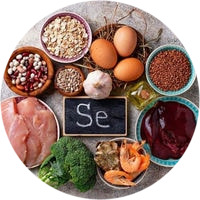
Selenium is a nutrient that is essential for maintaining DNA synthesis, thyroid hormone metabolism, and defense against infection and oxidative stress. The Office of Dietary Supplements (ODS)Trusted Source says this.
After obtaining it from foods containing trace levels, the body normally retains some selenium in human tissue, primarily in skeletal muscles. Brazil nuts, seafood, and meats are a few of these food items.
The content of selenium in a food depends on the land and water where it was grown. The mineral can also be taken as a supplement or added to meals.
The recommended daily intake of selenium, potential health benefits of consuming selenium via food or supplements, and several other topics are covered in this article.
Additionally, cysteine, an amino acid that contains sulfur, and selenium can link together to generate antioxidant selenoproteins in the body. Selenoproteins transport selenium to the tissues, lessen swelling, and promote a healthy thyroid and immune systems.
Since we are unable to create selenium on our own, getting enough must come from our diet, supplements, or a combination of the two. Although there is nothing wrong with taking a high-quality supplement, maintaining adequate levels of selenium by diet alone shouldn’t be a challenge for those who are already aiming to eat a healthy diet low in processed foods. It can require a little forethought, but we think once you read these health benefits of selenium, you’ll agree it’s well worth the effort.

Even though you don’t often hear about micronutrients, chromium is an important one. According to the National Institutes of Health (NIH), this mineral is involved in metabolizing protein, carbs, and lipids as well as supplying energy to your muscles and brain. However, it’s probably best recognized for its capacity to improve insulin sensitivity.
Chromium must be gained from diet or supplements because it does not naturally occur in the body like other minerals do. Here’s additional information about chromium, including how much you need, whether you may be deficient, how it may affect diabetes and weight loss, and the best foods to eat to get it.
Although we must consume trace amounts of chromium, the mineral comes in two forms, one of which can be harmful. According to the NIH, there are two types of chromium: trivalent, or chromium 3+, which is found in food, and hexavalent, or chromium 6+, which is released by industrial pollutants.
Some people use chromium supplements to manage metabolic syndrome, polycystic ovarian syndrome, diabetes, weight management, and muscle mass enhancement. However, the research that backs up these usage is sparse.
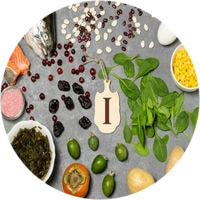
Iodine is a trace element that naturally occurs in soil and ocean. It is a necessary mineral, which means that the body cannot produce it on its own and must be consumed in order for it to operate.
All the iodine we require is present in many foods, including fish, seaweed, oysters, cereals, breads, some fruits and vegetables, and foods grown in soil or seawater rich in iodine.
This mineral can be added to foods, typically through iodized salt, or taken in multivitamins, in areas where the environment lacks it. Due to iodine supplementation in cattle feed and iodine-containing disinfectants used during milking, dairy products have a high iodine content.
Iodine is required by the thyroid in order to produce hormones that regulate development, metabolism, and other critical systemic processes.
Iodine is required by the thyroid in order to produce hormones that regulate development, metabolism, and other critical systemic processes. You can get thyroid disorders like goiters or hypothyroidism if you don’t get enough iodine.
Iodine is essential for healthy brain and bone development in utero and during infancy, thus women who are expecting or nursing must make sure they get enough iodine to meet their child’s needs.
Iodine deficiency is extremely uncommon in the United States, where the majority of people ingest iodized foods like salt, dairy, cereals, and bread. People continue to have iodine deficiency problems in various parts of the world, notably in mountainous areas like southeast Asia where the soil is lacking in iodine or where iodized food is not easily accessible or consumed.
According to the World Health Organization, iodine deficiency affects roughly 30% of the global population.
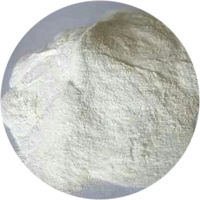
Dicalcium phosphate is a calcium supplement commonly found in prepared breakfast cereals, in pharmaceuticals as an inert ingredient to bind tablets, and in toothpastes. However, too much dicalcium phosphate, or dicalcium phosphate taken in conjunction with other medications, can have negative consequences. In addition, inhalation or skin exposure to the powdered form, if used as a reagent in a laboratory setting, for example, can be irritating.
The powdered form of dicalcium phosphate has the potential to irritate skin, according to the Material Safety Data Sheet. Dry or cracked skin may result from prolonged skin contact. A specific allergic reaction known as contact dermatitis, which is characterized by redness, swelling, or itching on skin areas that come into direct contact with an irritating material, could occur in those who have a dicalcium phosphate allergy. If the allergic reaction is severe, it may even spread to places that haven’t come into direct contact with the dicalcium phosphate.
Inhaling the dust from dicalcium phosphate powders may irritate the lungs and nasal passages, leading to coughing and sneezing, according to the Material Safety Data Sheet for powdered dicalcium phosphate.

For ages, both Asia and North America have used ginseng. Many people take it to increase their mental clarity, focus, memory, and physical stamina.
Additionally, it is used as a natural remedy for chronic fatigue, sadness, and anxiety. This well-known plant has a reputation for strengthening the immune system, warding off infections, and aiding erectile dysfunction in males.
The root was originally utilized by Native Americans as a stimulant, headache therapy, and cure for indigestion, fever, and infertility.
Approximately 6 million Americans daily benefit from the confirmed ginseng benefits today.

Because it is water soluble, vitamin C is not stored by the body. People must regularly eat foods containing vitamin C in order to maintain optimal amounts of the vitamin.
The body requires vitamin C for a number of processes. Here are a few examples:
It aids in the body’s production of L-carnitine, certain neurotransmitters, and collagen.
As an antioxidant, it aids in the removal of harmful molecules from the body known as reactive oxidative species (ROS).
It aids iron absorption in the body.
Increased immune function results.
It speeds up wound recovery.
Free radicals and other compounds known as ROS are byproducts of normal biological functions, pollution exposure, and other reasons. They might result in oxidative stress, which might damage cells.

The second of the eight B vitamins is known as riboflavin. All B vitamins assist the body’s process of converting food (carbohydrates) into the energy-producing fuel glucose. These B vitamins, commonly known as the B-complex vitamins, aid the body in the metabolism of fats and proteins. The liver, skin, hair, and eyes all require the B complex vitamins for good health. Additionally, they support healthy nervous system operation.
Because they are all water soluble, the B vitamins are not stored by the body.
Riboflavin not only gives the body energy but also functions as an antioxidant to combat harmful molecules called free radicals. Free radicals can harm cells and DNA, and may contribute to the aging process, as well as the development of a number of health disorders, including as heart disease and cancer. Riboflavin is an antioxidant that can combat free radicals and potentially lessen or even assist avoid some of the harm they cause.

The sixth of the eight B vitamins is known as pyridoxine. All B vitamins assist the body’s process of converting food (carbohydrates) into the energy-producing fuel glucose. These B vitamins, commonly known as the B-complex vitamins, aid the body in the metabolism of fats and proteins. Healthy skin, hair, eyes, and liver depend on the B-complex vitamins. Additionally, they support healthy nervous system operation.
Because they are all water soluble, the B vitamins are not stored by the body.
The body produces numerous neurotransmitters with the help of vitamin B6, which are substances that convey messages from one nerve cell to another. It is necessary for healthy brain growth and function, as well as for the body to produce the hormones melatonin, which helps regulate sleep, and the mood-altering hormones serotonin and norepinephrine.

Thiamine (vitamin B1), which can be found in many foods, is used to treat Wernicke-Korsakoff syndrome, low thiamine, beriberi, and a few other nerve illnesses. (WKS).
Our bodies need thiamine to use carbohydrates correctly. Additionally, it supports healthy nerve performance. It can be found in foods including meat, beans, nuts, yeast, and cereal grains. It is present in many vitamin B complex preparations and is frequently used in conjunction with other B vitamins.
Thiamine is used to treat diseases including beriberi and nerve irritation that are caused by low levels of the vitamin. (neuritis). There is no reliable scientific evidence to support its usage for several additional illnesses, including heart disease, diabetic nerve pain, and digestive issues.
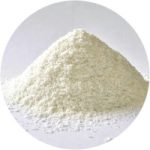
Vitamin E , commonly referred to as cosmetic grade vitamin E, is a popular vitamin supplement. Cosmetic grade vitamin e is frequently used in skin care products like skin creams. Pure vitamin e oil is an ester of acetic acid and tocopherol (vitamin E). Cosmetic-grade vitamin E is not oxidized and can enter live cells through the skin. There, about 5% of it is transformed to free tocopherol, which has protective antioxidant effects. Cosmetic grade vitamin E is utilized in place of tocopherol itself because the phenolic hydroxyl groups are inhibited, resulting in a less acidic product with a longer shelf life. Cosmetic-grade vitamin e is believed to provide sun protection by slowly hydrolyzing after being absorbed into the skin to regenerate tocopherols.

Among vitamins is vitamin A. Numerous fruits, vegetables, eggs, whole milk, butter, fortified margarine, meat, and oily saltwater seafood all contain it. It can also be produced in a lab. A class of yellow or orange compounds called carotenoids are present in plants. Some of these can be transformed by the body into vitamin A.
Treatment for a vitamin A deficit involves vitamin A. It is also used to enhance growth in kids who are vitamin A deficient as well as to lessen the effects of illnesses like malaria, HIV, measles, and diarrhea.
Some people take vitamin A to enhance eyesight and treat eye conditions such cataracts, retinitis pigmentosa, glaucoma, and age-related macular degeneration (AMD). After eye surgery, it may also be used to speed up healing.
In addition to treating acne and other skin diseases, vitamin A is also used to treat psoriasis, eczema, cold sores, wounds, burns, sunburn, ichthyosis (noninflammatory skin scaling), lichen planus pigmentosus, and pityriasis rubra pilaris.

Vitamin D, commonly known as “calciferol,” is a fat-soluble vitamin that is added to some foods, found naturally in a small number of others, and is also sold as a dietary supplement. Additionally, it is created internally when ultraviolet (UV) rays from sunshine strike the skin and start the production of vitamin D.
The biological inactive vitamin D that is received through sunlight, meals, and supplements must go through two hydroxylations in order to become active in the body. Vitamin D undergoes its first hydroxylation in the liver, resulting in 25-hydroxyvitamin D [25(OH)D], sometimes referred to as “calcidiol.” The physiologically active 1,25-dihydroxyvitamin D [1,25(OH)2D], often known as “calcitriol,” is created by the second hydroxylation, which largely takes place in the kidney.
Vitamin D maintains sufficient serum calcium and phosphate concentrations and encourages calcium absorption in the gut.
For healthy bone mineralization and to prevent hypocalcemic tetany, vitamin D maintains adequate serum calcium and phosphate concentrations and encourages calcium absorption in the gut. (involuntary contraction of muscles, leading to cramps and spasms). Additionally, osteoblasts and osteoclasts need it to repair and build new bone. Without enough vitamin D, bones may become fragile, deformed, or thin. Inadequate vitamin D prevents osteomalacia in adults and rickets in youngsters. Vitamin D, together with calcium, aids in preventing osteoporosis in older people.

Cobalamin, a name for vitamin B12, is one of the eight B vitamins. All B vitamins assist the body’s process of converting food (carbohydrates) into the energy-producing fuel glucose. These B vitamins, commonly known as B complex vitamins, aid in the body’s utilization of fats and proteins. In order to have healthy skin, hair, eyes, and liver, one must take b complex vitamins. Additionally, they support healthy nervous system operation.
The body does not store any B vitamins because they are all water soluble.
The creation of DNA and RNA, the body’s genetic material, as well as maintaining healthy nerve cells are two of the vitamin B12’s key functions. Vitamin B12 and vitamin B9, often known as folate or folic acid, collaborate closely to support the body’s absorption of iron and the production of red blood cells. S-adenosylmethionine (SAMe), a substance implicated in immune function and mood, is created when folate and B12 combine.

One form of iron is ferrous fumarate. Typically, the foods you eat provide you with iron. Iron is incorporated into your body’s hemoglobin (HEEM o glo bin) and myoglobin. (MY o glo bin). Your blood’s hemoglobin provides oxygen to your tissues and organs. Your muscle cells can store oxygen thanks to myoglobin.
Anemia caused by a lack of iron is treated with ferrous fumarate. (a lack of red blood cells caused by having too little iron in the body).
When taking your ferrous fumarate dose, avoid consuming meals high in fiber. Whole grains, uncooked veggies, and bran are examples of high-fiber foods.
You should wait at least 2 hours before or 2 hours after taking ferrous fumarate to consume any milk or other dairy products.

Workhorse element zinc is essential to numerous industrial processes that are frequently hidden from view. Archaeologists have discovered a small number of zinc artifacts that date as far back as 300 B.C., demonstrating that humans have employed zinc for many millennia. The metal is largely used today to coat steel and iron to stop rusting. But more crucially, zinc is necessary for a healthy diet. In reality, it is one of the most intricate and useful trace elements in our diet, and a lack of it can cause a variety of serious health issues.
Although the use of zinc dates back to antiquity, life sciences have long disregarded its significance. Scientists note that zinc was first recognized as being necessary for human health in 1961, and we are still learning exactly what functions this vitamin performs in our systems.
The finest sources of zinc, symptoms of potential deficiency, and what the science says about zinc’s potential health benefits are all covered in this article.

A kind of vitamin B3 is nicotinamide, often known as niacinamide. In addition to meat, fish, milk, eggs, green vegetables, and cereals, it can also be found in many other foods.
For sugars and fats to operate properly in the body and to keep cells healthy, niacinamide is necessary. When niacin is consumed in quantities more than what the body requires, it is transformed to niacinamide. Niacinamide doesn’t aid in the treatment of elevated cholesterol, unlike niacin.
Niacinamide is used to prevent vitamin B3 deficiency and related illnesses including pellagra. There isn’t enough solid scientific evidence to support the majority of these claims, which include treating ailments including acne, diabetes, cancer, osteoarthritis, aging skin, skin discolouration, and many others.
Niacinamide should not be confused with niacin, nicotinamide riboside, inositol nicotinate, or NADH.
Niacinamide should not be confused with niacin, L-tryptophan, NADH, nicotinamide riboside, or inositol nicotinate.

A kind of pantothenic acid, or vitamin B5, is called D-calcium pantothenate. found in milk, cereal grains, eggs, legumes, and both plant and animal tissues. Most well-known for boosting levels of glutathione, an essential substance assisting in the oxidation-reduction of cells, which protects cells against peroxidative damage.
A study of vitamin B5 is essentially what it takes to comprehend D-calcium pantothenate and the advantages it offers. The fifth of the eight B vitamins is frequently forgotten. It is a crucial ingredient that synthesizes and metabolizes lipids, carbohydrates, and proteins. It is also water-soluble and plays a significant role in supporting the efficiency of enzymes. These processes provide vitamin B5 a broad impact on how the body works.

Your body requires the mineral magnesium to function properly. It supports hundreds of vital bodily functions, including those that regulate the function of your muscles and nerves. It aids in maintaining appropriate blood sugar levels, a healthy heart, and strong bones. It also affects how energetic you are. Magnesium is present in a variety of foods and beverages. However, if your doctor believes you require more, they might advise adding supplements.
About 310 milligrams of magnesium are required by an adult woman per day, and 320 mg beyond the age of 30. Women who are pregnant require an extra 40 mg. Under-31-year-old adult men require 400 milligrams, and those over-31 need 420 milligrams. Depending on their age and gender, children need anywhere between 30 and 410 milligrams. How much magnesium your child requires should be discussed with your pediatrician.

Each and every cell in your body needs the mineral potassium. It supports the proper functioning of virtually every organ in your body, including the heart, kidneys, brain, nerves, and other muscles. The amount of things it can perform for you could surprise you.
Like calcium, sodium, and other electrolytes, it is one of those. They regulate the amount of water in your body, support the maintenance of your body’s electrical system, and transport nutrients and waste out of your cells. Additionally, potassium controls sodium, which among other things lowers blood pressure.
By balancing the amount of potassium taken with the amount lost, the body maintains the proper level. Potassium is mainly excreted in urine and ingested in foods and beverages that also include electrolytes like potassium. In addition to sweating and digestion, potassium is also lost. Potassium excretion can be adapted by healthy kidneys to match variations in consumption.
The flow of potassium into and out of cells is impacted by a number of medicines and medical conditions, which significantly affects the potassium level in blood.

Numerous biological processes, such as the metabolism of amino acids, cholesterol, glucose, and carbohydrates, are aided by manganese. Additionally, it helps with blood coagulation, bone development, and inflammation control.
The liver, pancreas, bones, kidneys, and brain may all store manganese, which the human body cannot make. Manganese is typically consumed as part of a healthy diet.
Superoxide dismutase is an antioxidant enzyme that manganese aids in the formation of. (SOD). Free radicals, which are chemicals that kill or harm bodily cells, are kept at bay by antioxidants.
This procedure may lessen inflammation caused by inflammatory bowel disease, psoriasis, and lung pleurisy in animal and laboratory models.

The majority of people associate copper with the metal used to create bright pennies. However, copper is a necessary vitamin that has an impact on your health.
Your body uses copper in a wide variety of ways. Your skin, nails, and hair all get better. Additionally, it promotes healthy organ function. Even during pregnancy, it promotes fetal growth.
Most proteins in your body include some copper. It is necessary for a body to function properly and be in good health.
Copper is necessary for your body to perform necessary processes. Your body uses copper to make energy and maintain healthy blood vessels. Your immune system will be supported. It’s essential for the growth of your brain and your nervous system.
The liver receives a significant portion of the circulating copper as ceruloplasmin-bound copper. A sialoglycoprotein called ceruloplasmin is continuously secreted into the blood from the liver. The sialic acid can be eliminated by the outer endothelium cells when ceruloplasmin returns to the liver, and the desialated protein can then be endocytosed via the asialoglycoprotein receptor in the liver parenchyma. Similar to how copper removal from ceruloplasmin speeds up liver parenchymal cells’ uptake of the substance.

Selenium is a nutrient that is essential for maintaining DNA synthesis, thyroid hormone metabolism, and defense against infection and oxidative stress. The Office of Dietary Supplements (ODS)Trusted Source says this.
After obtaining it from foods containing trace levels, the body normally retains some selenium in human tissue, primarily in skeletal muscles. Brazil nuts, seafood, and meats are a few of these food items.
The content of selenium in a food depends on the land and water where it was grown. The mineral can also be taken as a supplement or added to meals.
The recommended daily intake of selenium, potential health benefits of consuming selenium via food or supplements, and several other topics are covered in this article.
Additionally, cysteine, an amino acid that contains sulfur, and selenium can link together to generate antioxidant selenoproteins in the body. Selenoproteins transport selenium to the tissues, lessen swelling, and promote a healthy thyroid and immune systems.
Since we are unable to create selenium on our own, getting enough must come from our diet, supplements, or a combination of the two. Although there is nothing wrong with taking a high-quality supplement, maintaining adequate levels of selenium by diet alone shouldn’t be a challenge for those who are already aiming to eat a healthy diet low in processed foods. It can require a little forethought, but we think once you read these health benefits of selenium, you’ll agree it’s well worth the effort.

Even though you don’t often hear about micronutrients, chromium is an important one. According to the National Institutes of Health (NIH), this mineral is involved in metabolizing protein, carbs, and lipids as well as supplying energy to your muscles and brain. However, it’s probably best recognized for its capacity to improve insulin sensitivity.
Chromium must be gained from diet or supplements because it does not naturally occur in the body like other minerals do. Here’s additional information about chromium, including how much you need, whether you may be deficient, how it may affect diabetes and weight loss, and the best foods to eat to get it.
Although we must consume trace amounts of chromium, the mineral comes in two forms, one of which can be harmful. According to the NIH, there are two types of chromium: trivalent, or chromium 3+, which is found in food, and hexavalent, or chromium 6+, which is released by industrial pollutants.
Some people use chromium supplements to manage metabolic syndrome, polycystic ovarian syndrome, diabetes, weight management, and muscle mass enhancement. However, the research that backs up these usage is sparse.

Iodine is a trace element that naturally occurs in soil and ocean. It is a necessary mineral, which means that the body cannot produce it on its own and must be consumed in order for it to operate.
All the iodine we require is present in many foods, including fish, seaweed, oysters, cereals, breads, some fruits and vegetables, and foods grown in soil or seawater rich in iodine.
This mineral can be added to foods, typically through iodized salt, or taken in multivitamins, in areas where the environment lacks it. Due to iodine supplementation in cattle feed and iodine-containing disinfectants used during milking, dairy products have a high iodine content.
Iodine is required by the thyroid in order to produce hormones that regulate development, metabolism, and other critical systemic processes.
Iodine is required by the thyroid in order to produce hormones that regulate development, metabolism, and other critical systemic processes. You can get thyroid disorders like goiters or hypothyroidism if you don’t get enough iodine.
Iodine is essential for healthy brain and bone development in utero and during infancy, thus women who are expecting or nursing must make sure they get enough iodine to meet their child’s needs.
Iodine deficiency is extremely uncommon in the United States, where the majority of people ingest iodized foods like salt, dairy, cereals, and bread. People continue to have iodine deficiency problems in various parts of the world, notably in mountainous areas like southeast Asia where the soil is lacking in iodine or where iodized food is not easily accessible or consumed.
According to the World Health Organization, iodine deficiency affects roughly 30% of the global population.

Dicalcium phosphate is a calcium supplement commonly found in prepared breakfast cereals, in pharmaceuticals as an inert ingredient to bind tablets, and in toothpastes. However, too much dicalcium phosphate, or dicalcium phosphate taken in conjunction with other medications, can have negative consequences. In addition, inhalation or skin exposure to the powdered form, if used as a reagent in a laboratory setting, for example, can be irritating.
The powdered form of dicalcium phosphate has the potential to irritate skin, according to the Material Safety Data Sheet. Dry or cracked skin may result from prolonged skin contact. A specific allergic reaction known as contact dermatitis, which is characterized by redness, swelling, or itching on skin areas that come into direct contact with an irritating material, could occur in those who have a dicalcium phosphate allergy. If the allergic reaction is severe, it may even spread to places that haven’t come into direct contact with the dicalcium phosphate.
Inhaling the dust from dicalcium phosphate powders may irritate the lungs and nasal passages, leading to coughing and sneezing, according to the Material Safety Data Sheet for powdered dicalcium phosphate.
Benefits brain functions. Good for physical & mental health. Helps
maintain healthy skin & hair.
Boost Immune System. Have Potential benefit against cancer. Fight tiredness & increase energy level.
Boost your immune system.Increases your iron absorption.Helps maintain healthy skin & hair.
Helps in the reduction of tiredness & fatigue. Helps in the maintenance of normal function of the nervous system.
Prevents & treat anemia by aiding hemoglobin production. Improve mood & reduce symptoms of depression.
Helps in proper functioning of digestive system.Strengthen immune system.
Boost energy performance. Helps prevent migraine.
It improves blood sugar.It may reduce hunger and cravings.
Treating thyroid cancer. Improving birth weight
Helps in red blood cell formation & anemia prevention. Prevents major birth defects.
Yorest Capsules With Elderberry Extract, Echinacea Extract, Vitamin C, Garlic Extract, Zinc & Fruit Powder Blend. The combination of these ingredients helps neutralize free radicals, boost immunity and metabolism, support bladder, heart, and respiratory health as well as promote healthy cholesterol levels and enhance skin health.
Each capsule of yorest contains a blend of 600 mg of a signature, potent formulation for your well-being. 60N Vegetarian Capsules Per Pack.
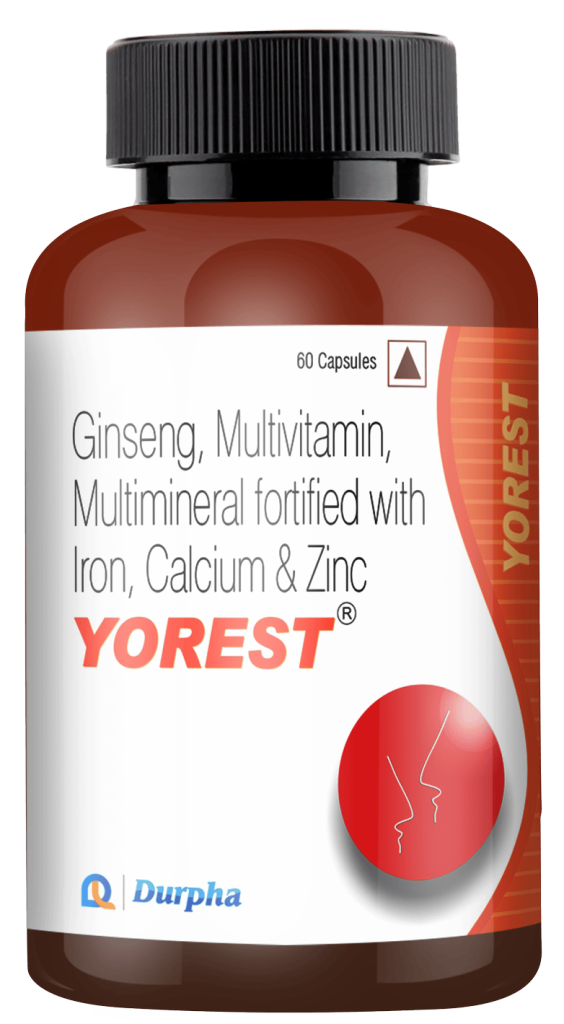
Real immunity booster. Will highly recommend the product to everyone.
Very effective in this Pandemic. The ingredients present in it is helping my body from post COVID weakness. I strongly recommending this product to everyone.
Very useful product. I thank the company for such a wonderful product.
A very good capsule for overall health of the family. recommended for one and all....
Keeping your immune system strong is vital for preventing illness and ensuring overall health. While modern medicine provides treatments, adding natural immune…
A strong immune system is crucial for good health. Consuming the right nutrients can significantly improve your body’s defenses. Certain vitamins are…
Understanding How Immunity Works and the Best Ways to Boost It is essential for maintaining good health. Your immune system consists of a…
Ginseng seems to be beneficial in the control of blood glucose in people both with and without diabetes.
American and Asian ginseng has been shown to improve pancreatic cell function, boost insulin production and enhance the uptake of blood sugar in tissues.
Moreover, studies show that ginseng extracts help by providing antioxidant protection that reduces free radicals in the cells of those with diabetes.